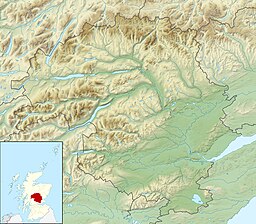Stormont Loch (also known as Loch Stormont or Loch Bog) is a small irregular lowland freshwater loch, that is partially in-filled. It located in a nature reserve owned by the Scottish Wildlife Trust,[3] on a north-east to south-west orientation and is 2 miles southeast of Blairgowrie in Perth and Kinross.[1][2]
| Stormont Loch | |
|---|---|
| Location | NO191422 |
| Coordinates | 56°33′56″N 3°19′02″W / 56.565500°N 3.317300°W |
| Type | freshwater loch |
| Max. length | 1.06 km (0.66 mi)[1] |
| Max. width | 0.48 km (0.30 mi)[1] |
| Surface area | 14.3 ha (35 acres)[2] |
| Average depth | 2 ft (0.61 m)[1] |
| Max. depth | 3 ft (0.91 m)[1] |
| Water volume | 4,867,000 cu ft (137,800 m3)[1] |
| Shore length1 | 1.9 km (1.2 mi) [2] |
| Surface elevation | 54 m (177 ft)[2] |
| Max. temperature | 64 °F (18 °C) |
| Islands | 0 |
| 1 Shore length is not a well-defined measure. | |
Geography
editStormont Loch is of glacial origin and is formed as a type of geographic formation known as a kettle.[3] The loch is of national importance as it provides a complete dating record for vegetation changes over the last 13000 years.[4]
The loch is a designated Site of Special Scientific Interest (SSSI), as well as forming part of a Special Area of Conservation.[5]
See also
editReferences
edit- ^ a b c d e f John, Murray; Lawrence, Pullar. Bathymetrical Survey of the Fresh-Water Lochs of Scotland, 1897-1909 Lochs of the Tay Basin Volume II - Stormont Loch. National Library of Scotland. p. 110. Retrieved 19 June 2019. This article incorporates text from this source, which is in the public domain.
- ^ a b c d "Stormont Loch". British Lakes. Retrieved 19 June 2019.
- ^ a b Gittings, Bruce; Munro, David. "Stormont Loch". The Gazetteer for Scotland. School of GeoSciences, University of Edinburgh and The Royal Scottish Geographical Society. Retrieved 19 June 2019.
- ^ Caseldine, C.J. "Stormont Loch" (PDF). Geological Conservation Review. 6 (14 Eastern Highland Boundary). Joint Nature Conservation Committee.
- ^ Dunkeld - Blairgowrie Lochs, Joint Nature Conservation Committee
